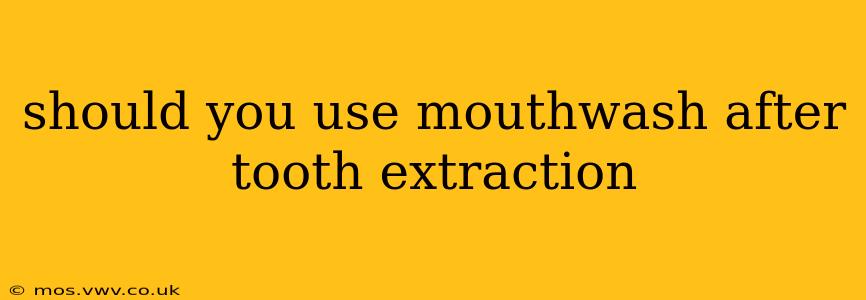Should You Use Mouthwash After Tooth Extraction?
The question of whether or not to use mouthwash after a tooth extraction is a common one, and the answer isn't a simple yes or no. While mouthwash can seem like a good idea for keeping your mouth clean, using it immediately following an extraction can actually hinder the healing process and even cause complications. Let's delve into the details to understand why.
What Happens After a Tooth Extraction?
After a tooth extraction, a blood clot forms in the socket where the tooth was removed. This blood clot is crucial for healing; it protects the underlying bone and nerves, and provides a foundation for new tissue growth. Disturbing this blood clot can lead to a serious complication called dry socket.
Why You Shouldn't Use Mouthwash Immediately After Extraction
The strong chemicals and ingredients found in many mouthwashes can disrupt this vital blood clot. The alcohol, often a key component in mouthwashes, can dissolve the clot, while other ingredients can irritate the sensitive extraction site. This can result in:
- Dry Socket (Alveolar Osteitis): This painful condition occurs when the blood clot is dislodged or dissolves, exposing the bone and nerves in the socket. Dry socket is characterized by severe pain, bad breath, and sometimes even a foul-tasting discharge.
- Delayed Healing: Irritating the extraction site can slow down the healing process and increase the risk of infection.
When Can You Use Mouthwash After Tooth Extraction?
Generally, it's recommended to wait at least 24-48 hours after your extraction before using any kind of mouthwash. Even then, choose your mouthwash carefully.
What Kind of Mouthwash Should You Use (and When)?
If your dentist approves, a gentle, alcohol-free mouthwash can be used several days after the extraction, but it’s important to use it carefully and sparingly to avoid disturbing the healing process. Always follow your dentist's specific instructions regarding mouthwash use.
What are the best practices for oral hygiene after a tooth extraction?
The best post-extraction oral hygiene routine focuses on gentle cleaning to avoid disturbing the clot. This typically involves:
- Gentle Brushing and Flossing: Avoid brushing or flossing directly over the extraction site for the first few days. Gently brush and floss around the area, but avoid any contact with the socket.
- Saltwater Rinses: These are often recommended by dentists as a safe and effective way to clean the mouth and promote healing. Mix a half-teaspoon of salt in a glass of warm water and gently rinse your mouth several times a day.
Can I use mouthwash if I have a dry socket?
No. If you suspect you have a dry socket, do not use mouthwash. Contact your dentist immediately. They can provide appropriate treatment to manage the pain and promote healing.
What other things should I avoid after a tooth extraction?
Besides mouthwash (at least initially), you should also avoid:
- Smoking: Smoking significantly increases the risk of dry socket and other complications.
- Using a straw: The sucking motion can dislodge the blood clot.
- Touching the extraction site: Avoid touching or probing the area with your tongue or fingers.
- Strenuous activity: Rest is important for healing. Avoid strenuous exercise or activities that could increase blood pressure and risk bleeding.
How long does it take for the extraction site to heal completely?
Healing time varies depending on the type of extraction and individual factors. It can take several weeks or even months for the extraction site to completely heal and for new bone to form. Regular follow-up appointments with your dentist are crucial to monitor the healing process.
Remember, the information provided here is for general knowledge and doesn't replace professional dental advice. Always consult your dentist or oral surgeon for personalized recommendations regarding your specific situation and post-extraction care. They can assess your individual needs and guide you on the best way to maintain oral hygiene and ensure proper healing after your tooth extraction.
